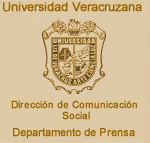
| Año 3 • No. 106 • junio 16 de 2003 | Xalapa • Veracruz • México |
Publicación
Semanal |
| Overcoming
the Fear Factor in Language Acquisition By Jay Bildstein |
|
| This
past May 22nd I had the pleasure of addressing the 2nd Annual Forum
on Education sponsored by the Language Department of uv. The invitation
came from none other then Rosben Olivera whose name is probably familiar
to you as the gentleman who has been rendering the translations of
my bimonthly articles into Spanish. (As a side note, we have begun
to receive translations from students practicing their English skills
and the results have been impressive.) Rosben, himself a student of
English and an excellent one at that, invited me to speak at the Forum
after he reviewed one of my articles on language acquisition. I spoke to those at my seminar about overcoming the fear factor, something that is key, not only in learning and utilizing a newly acquired language, but is perhaps the single most potent skill we can learn to keep ourselves growing as human beings; continually reaching out to conquer new challenges. Franklin Delano Roosevelt, the President of the United States during not only the Great Depression but also World War II, is quoted as saying “There is nothing to fear but fear itself.” In a sense, truer words were never spoken, for if we are gripped by fear; cold, icy, mind-numbing fear that prohibits us from utilizing our otherwise boundless talents and reserve of energies, how on earth can we accomplish anything significant in life? Truth be known, the vast majority of people live lives that are circumscribed by fear, a fear of the unknown, a fear of embarrassment, a fear of success, a fear of death … a variety of fears that prevent us from truly living up to our potentials. While Roosevelt was right as far as I am concerned, a much more important quote, in my mind, should be “There is nothing to fear but the lack of training in how to overcome fear itself.” Therefore, let us see what some strategies are that indeed may aid us in the overcoming of fear in general and thus be useful in the overcoming of the fear of speaking in or using a newly acquired language in specific. Steps to Overcoming Fear: (These are just a sampling of many techniques available to you). 1.
Open your mind to this notion, “I don’t believe in lazy
people, I believe in scared people avoiding their fears.” Write
this quote down on an index card, read it upon awakening in the
morning and then carry it with you during the day, reading it at
least 3 times. Before retiring at night, read it again. This concept,
repeated as an affirmation will help you to better understand your
true nature. If you tend not to get things done in your life you
may view yourself as lazy. This concept will help you get to the
root of your procrastinations and that which generally holds you
back from accomplishing 2. Understand that most fears have their roots in our childhoods. One of the first words we learn as children is the word “no.” Parents generally tell us “no” at a young age to protect us from the dangers of the world. The downside to this is that many of us become programmed into being possibility negators instead of possibility thinkers and doers. When we don’t believe we can summon the ability to accomplish something, we tend to become afraid of it. 3. Utilize visualization to help you see something in your mind before you do it in reality. Find a comfortable place to sit down in your home, a quiet place. Sit down and close your eyes. Relax. Take ten deep breathes, in through your nose and out through your mouth. Work on visualizing whatever challenging task you have before you in your life. While sitting relaxed in the chair, run a movie in your mind of you doing whatever it is that you are intimidated by in real life. Do this at least once a day. This technique is powerful and is used by Olympic athletes and other performers to augment their actual training. Remember, if you can see it in your mind you can make it happen in reality. See it,then be it. 4.
Ever hear the quote “Familiarity breeds contempt?” Match
it with the concept of “do what you fear most and you conquer
fear.” This is accomplished through practice, drill and rehearsal
of that which scares you. We call this the process of desensitization.
If you are scared of speaking in the new language that you are studying,
be relentless in your use of it. Move forward when you are inclined
to retreat. Remember the famous words of Goethe “Be Bold -
Whatever you can do, or dream you can, begin it. Boldness has genius,
power and magic in it.” |
|
